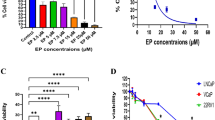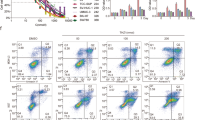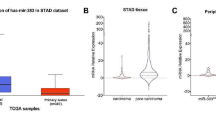Abstract
Purpose
In this study, we firstly investigated the regulative effect of miR-204 on Sirt1 expression in prostate cancer cells. Then, we examined whether miR-204 downregulation in the cells is a result of UCA1 upregulation. In addition, the regulative effect of UCA1/miR-204/Sirt1 axis on docetaxel sensitivity of prostate cancer cells was studied.
Methods
QRT-PCR was performed to detect UCA1, miR-204 and Sirt1 mRNA expression. Western blot assay was performed to assess Sirt1, P-gp and caspase-3 expression. The regulative effect of UCA1/miR-204/Sirt1 axis on docetaxel sensitivity of prostate cancer cells was examined by measurement of docetaxel IC50, dictation of cleaved caspase-3 and flow cytometric analysis of cell apoptosis.
Results
MiR-204 negatively modulated Sirt1 expression in prostate cancer cells. UCA1 upregulation directly resulted in decreased miR-204 expression. UCA1 overexpression resulted in increased Sirt1 expression in PNT2 cells, while knockdown of endogenous UCA1 led to decreased Sirt1 in LNCaP and 22RV1 cells. UCA1 siRNA, Sirt1 siRNA and miR-204 mimics could enhance docetaxel-induced activation of caspase-3 and cell apoptosis in 22RV1/DR cells.
Conclusions
There is a UCA1/miR-204/Sirt1 axis in LNCaP and 22RV1 cells. The UCA1/miR-204/Sirt1 axis plays an important role in modulating in vitro docetaxel sensitivity of the prostate cancer cells.




Similar content being viewed by others
References
Qiu MT, Hu JW, Yin R, Xu L (2013) Long noncoding RNA: an emerging paradigm of cancer research. Tumour Biol 34(2):613–620. doi:10.1007/s13277-013-0658-6
Zhang N, Yang GQ, Shao XM, Wei L (2016) GAS5 modulated autophagy is a mechanism modulating cisplatin sensitivity in NSCLC cells. Eur Rev Med Pharmacol Sci 20(11):2271–2277
Zhang JH, Wei HW, Yang HG (2016) Long noncoding RNA SNHG15, a potential prognostic biomarker for hepatocellular carcinoma. Eur Rev Med Pharmacol Sci 20(9):1720–1724
Wang XS, Zhang Z, Wang HC, Cai JL, Xu QW, Li MQ, Chen YC, Qian XP, Lu TJ, Yu LZ, Zhang Y, Xin DQ, Na YQ, Chen WF (2006) Rapid identification of UCA1 as a very sensitive and specific unique marker for human bladder carcinoma. Clin Cancer Res Official Journal of the American Association for Cancer Research 12(16):4851–4858. doi:10.1158/1078-0432.CCR-06-0134
Tuo YL, Li XM, Luo J (2015) Long noncoding RNA UCA1 modulates breast cancer cell growth and apoptosis through decreasing tumor suppressive miR-143. Eur Rev Med Pharmacol Sci 19(18):3403–3411
Xiao C, Wu CH, Hu HZ (2016) LncRNA UCA1 promotes epithelial-mesenchymal transition (EMT) of breast cancer cells via enhancing Wnt/beta-catenin signaling pathway. Eur Rev Med Pharmacol Sci 20(13):2819–2824
Wang F, Ying HQ, He BS, Pan YQ, Deng QW, Sun HL, Chen J, Liu X, Wang SK (2015) Upregulated lncRNA-UCA1 contributes to progression of hepatocellular carcinoma through inhibition of miR-216b and activation of FGFR1/ERK signaling pathway. Oncotarget 6(10):7899–7917. doi:10.18632/oncotarget.3219
Wang F, Li X, Xie X, Zhao L, Chen W (2008) UCA1, a non-protein-coding RNA up-regulated in bladder carcinoma and embryo, influencing cell growth and promoting invasion. FEBS Lett 582(13):1919–1927. doi:10.1016/j.febslet.2008.05.012
Na XY, Liu ZY, Ren PP, Yu R, Shang XS (2015) Long non-coding RNA UCA1 contributes to the progression of prostate cancer and regulates proliferation through KLF4-KRT6/13 signaling pathway. Int J Clin Exp Med 8(8):12609–12616
Xue M, Pang H, Li X, Li H, Pan J, Chen W (2015) Long noncoding RNA UCA1 promotes bladder cancer cell migration and invasion via hsa-miR-145/ZEB1/2/FSCN1 pathway. Cancer Sci. doi:10.1111/cas.12844
Bian Z, Jin L, Zhang J, Yin Y, Quan C, Hu Y, Feng Y, Liu H, Fei B, Mao Y, Zhou L, Qi X, Huang S, Hua D, Xing C, Huang Z (2016) LncRNA-UCA1 enhances cell proliferation and 5-fluorouracil resistance in colorectal cancer by inhibiting miR-204-5p. Sci Rep 6:23892. doi:10.1038/srep23892
Ding M, Lin B, Li T, Liu Y, Li Y, Zhou X, Miao M, Gu J, Pan H, Yang F, Li T, Liu XY, Li R (2015) A dual yet opposite growth-regulating function of miR-204 and its target XRN1 in prostate adenocarcinoma cells and neuroendocrine-like prostate cancer cells. Oncotarget 6(10):7686–7700
Wilking MJ, Ahmad N (2015) The role of SIRT1 in cancer: the saga continues. Am J Pathol 185(1):26–28. doi:10.1016/j.ajpath.2014.10.002
Yang X, Yang Y, Gan R, Zhao L, Li W, Zhou H, Wang X, Lu J, Meng QH (2014) Down-regulation of mir-221 and mir-222 restrain prostate cancer cell proliferation and migration that is partly mediated by activation of SIRT1. Plos One 9(6):e98833. doi:10.1371/journal.pone.0098833
Lovaas JD, Zhu L, Chiao CY, Byles V, Faller DV, Dai Y (2013) SIRT1 enhances matrix metalloproteinase-2 expression and tumor cell invasion in prostate cancer cells. Prostate 73(5):522–530. doi:10.1002/pros.22592
Byles V, Zhu L, Lovaas JD, Chmilewski LK, Wang J, Faller DV, Dai Y (2012) SIRT1 induces EMT by cooperating with EMT transcription factors and enhances prostate cancer cell migration and metastasis. Oncogene 31(43):4619–4629. doi:10.1038/onc.2011.612
Moore RL, Faller DV (2013) SIRT1 represses estrogen-signaling, ligand-independent ERalpha-mediated transcription, and cell proliferation in estrogen-responsive breast cells. Journal Endocrinol 216(3):273–285. doi:10.1530/JOE-12-0102
Kojima K, Ohhashi R, Fujita Y, Hamada N, Akao Y, Nozawa Y, Deguchi T, Ito M (2008) A role for SIRT1 in cell growth and chemoresistance in prostate cancer PC3 and DU145 cells. Biochem Biophys Res Commun 373(3):423–428. doi:10.1016/j.bbrc.2008.06.045
Biernacka KM, Uzoh CC, Zeng L, Persad RA, Bahl A, Gillatt D, Perks CM, Holly JM (2013) Hyperglycaemia-induced chemoresistance of prostate cancer cells due to IGFBP2. Endocr Relat Cancer 20(5):741–751. doi:10.1530/ERC-13-0077
Zhang L, Wang X, Chen P (2013) MiR-204 down regulates SIRT1 and reverts SIRT1-induced epithelial-mesenchymal transition, anoikis resistance and invasion in gastric cancer cells. BMC Cancer 13:290. doi:10.1186/1471-2407-13-290
Shi Y, Huang J, Zhou J, Liu Y, Fu X, Li Y, Yin G, Wen J (2015) MicroRNA-204 inhibits proliferation, migration, invasion and epithelial-mesenchymal transition in osteosarcoma cells via targeting Sirtuin 1. Oncol Rep 34(1):399–406. doi:10.3892/or.2015.3986
O’Neill AJ, Prencipe M, Dowling C, Fan Y, Mulrane L, Gallagher WM, O’Connor D, O’Connor R, Devery A, Corcoran C, Rani S, O’Driscoll L, Fitzpatrick JM, Watson RW (2011) Characterisation and manipulation of docetaxel resistant prostate cancer cell lines. Mol Cancer 10:126. doi:10.1186/1476-4598-10-126
Kerb R, Hoffmeyer S, Brinkmann U (2001) ABC drug transporters: hereditary polymorphisms and pharmacological impact in MDR1, MRP1 and MRP2. Pharmacogenomics 2(1):51–64. doi:10.1517/14622416.2.1.51
Ramalinga M, Roy A, Srivastava A, Bhattarai A, Harish V, Suy S, Collins S, Kumar D (2015) MicroRNA-212 negatively regulates starvation induced autophagy in prostate cancer cells by inhibiting SIRT1 and is a modulator of angiogenesis and cellular senescence. Oncotarget 6(33):34446–34457. doi:10.18632/oncotarget.5920
Kumar P, Sharad S, Petrovics G, Mohamed A, Dobi A, Sreenath TL, Srivastava S, Biswas R (2016) Loss of miR-449a in ERG-associated prostate cancer promotes the invasive phenotype by inducing SIRT1. Oncotarget. doi:10.18632/oncotarget.8061
Duan K, Ge YC, Zhang XP, Wu SY, Feng JS, Chen SL, Zhang LI, Yuan ZH, Fu CH (2015) miR-34a inhibits cell proliferation in prostate cancer by downregulation of SIRT1 expression. Oncol Lett 10(5):3223–3227. doi:10.3892/ol.2015.3645
Todorova K, Metodiev MV, Metodieva G, Zasheva D, Mincheff M, Hayrabedyan S (2016) miR-204 is dysregulated in metastatic prostate cancer in vitro. Mol Carcinog 55(2):131–147. doi:10.1002/mc.22263
Nie W, Ge HJ, Yang XQ, Sun X, Huang H, Tao X, Chen WS, Li B (2016) LncRNA-UCA1 exerts oncogenic functions in non-small cell lung cancer by targeting miR-193a-3p. Cancer Lett 371(1):99–106. doi:10.1016/j.canlet.2015.11.024
Fan Y, Shen B, Tan M, Mu X, Qin Y, Zhang F, Liu Y (2014) Long non-coding RNA UCA1 increases chemoresistance of bladder cancer cells by regulating Wnt signaling. FEBS J 281(7):1750–1758. doi:10.1111/febs.12737
Acknowledgments
This work was supported by National Natural Science Foundation (81570272, Bo YANG).
Author information
Authors and Affiliations
Corresponding author
Ethics declarations
Conflict of interest
The authors have no conflict of interest.
Rights and permissions
About this article
Cite this article
Wang, X., Yang, B. & Ma, B. The UCA1/miR-204/Sirt1 axis modulates docetaxel sensitivity of prostate cancer cells. Cancer Chemother Pharmacol 78, 1025–1031 (2016). https://doi.org/10.1007/s00280-016-3158-8
Received:
Accepted:
Published:
Issue Date:
DOI: https://doi.org/10.1007/s00280-016-3158-8




